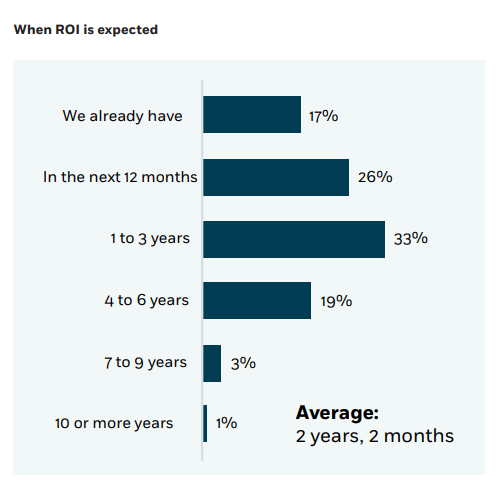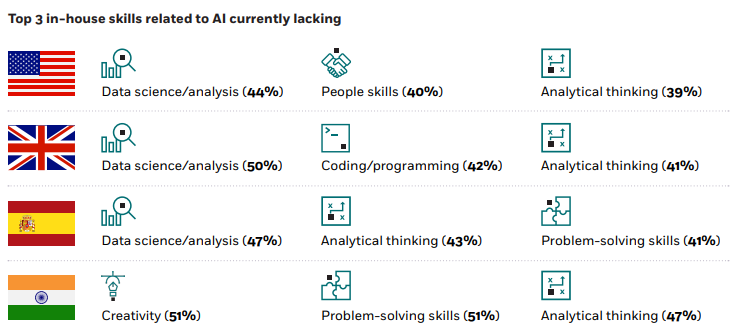Businesses are on board with AI, but they are facing significant talent, compliance and security challenges – here’s the solution, according to new reports from UST and Searce.
The benefits of AI are clear, but actually reaping the rewards is much easier said than done.
There are huge compliance, skills and security limitations on AI, and this is preventing organizations from fully implementing the technology, according to two new reports from UST and Searce.
We unpick the data with the help of UST's Chief Data Scientist Heather Dawe.
Organizations are bought into the potential of AI to transform their businesses for the better.
This trend has been identified by the likes of Slack, IBM and Upwork, and now has been confirmed by new research from UST, a global digital transformation solutions company.
93% of the 600 IT decision makers in the US, UK, India and Spain surveyed by UST believe that AI is essential to their company’s success over the next five years.
This explains why 92% are linking AI implementation with strategic objectives, and companies expect to see a return on investment within the next two years on average.

Credit: UST: AI in the Enterprise. Managing is on board the AI ship but without a crew or compass.
Plus, UST found that just 1% had no plans to implement AI in their organization, and only 14% did not understand the benefits of AI.
The top benefits of AI at work, according to UST’s report, were helping with decision making (52%), improving customer experience (51%), reducing operational cost and improving productivity (50%), and meeting ESG goals, like achieving net zero (89%).
US-based tech consulting firm Searce’s polling of 300 C-Suite and senior technology executives in the US and UK – including Chief AI Officers, Chief Digital Officers and Chief Transformation Officers – validates UST’s findings.
Searce found that six in ten strongly agree that AI is a key priority for their business (plus 37% agree).
Also, 93% of respondents had reported positive outcomes from AI; this was linked to its ability to drive revenue growth, produce new business opportunities and drive down costs.
The issue is that “management is on board the AI ship but without a crew and compass” – that’s what UST named its report.
They are struggling to navigate unchartered waters, and the challenges with AI at work – UST”s research found that just 8% of organizations are facing no barriers in implementing AI.
The biggest challenge is a skills shortage – three quarters of respondents are facing issues here. The main in-house skills currently lacking are analytic thinking, data science, people skills and problem-solving.

Credit: UST: AI in the Enterprise. Managing is on board the AI ship but without a crew or compass.
But there are other issues; organizations are also struggling with the AI implementation process itself (44%), plus 40% have security concerns, and 33% are facing compliance and regulatory challenges.
Data privacy issues were the highest-ranking limitation on AI adoption for Searce (45%), followed by issues with legacy technology and a lack of qualified talent (40%).
The impact here is “profound”, according to Searce.
Data privacy concerns, ranking highest, reflect the growing apprehension about safeguarding sensitive information, complying with regulations, and maintaining consumer trust,” stated the report.
UST’s research corroborates this conclusion. It found that nine in ten IT leaders believe that organizations must have a responsible AI framework or policy.
Currently just 39% think their current approach to responsible AI is effective, and nine in ten believe that more regulation is necessary to support the implementation of truly responsible AI.
It is clear that if organizations want to reap the rewards of AI at work, they need to make some changes, and quickly.
89% of IT leaders told UST that they need to increase spending on AI to keep up with the competition.
Searce’s data also found a need to grow spending, with a quarter planning to raise spending by more than 50%, and only 1% saying they wouldn’t increase their AI spend.
Writing in Searce’s report, the consultancy’s Managing Director for EMEA, Julian Mulhare, stated: “As global investments in AI continue to rise, as our research has found, it is crucial for businesses to focus not just on spending, but on the tangible returns these investments can deliver.”
The question that remains is where should companies focus their investment?
Having a strong AI framework is a crucial starting point.
Speaking exclusively to UNLEASH Heather Dawe, Chief Data Scientist & Head of Responsible AI at UST, shares that HR leaders and teams must have a clear role in creating these policies.
From a people perspective, not only does such a policy serve as a roadmap for the development, deployment and management of AI solutions, but also how these solutions positively impact the wider workforce.
“With a clear framework which takes into account both material business and considers employee needs, we can better allocate resources and invest in the right areas”, whether that’s ethical AI, mitigating AI biases, or skills.
On the topic of skills, UST calls for organizations to embrace continuous learning and creating a culture of adaptation – the AI landscape is constantly shifting and evolving after all – when upskilling internally.
However, there is also the option to rely on third party expertise to help plug some of the gaps.
57% of IT leaders told UST that they plan to engage external experts in the next three years, and Searce’s data shows that the majority of organizations are working with external partners to introduce AI into heir organization.
Organizations, are you ready to think outside the box with AI?
Get the Editor’s picks of the week delivered straight to your inbox!

Chief Reporter
Allie is an award-winning business journalist and can be reached at alexandra@unleash.ai.
"*" indicates required fields
"*" indicates required fields